Ready to rise above the competition? Make content your #1 source of new clients.
A lot of law firm websites look the part — sharp design, clean logo, professional headshots. But the moment a potential client starts reading… it all falls apart.
It’s either full of legal jargon, copied from a template, or hasn’t been updated in years.
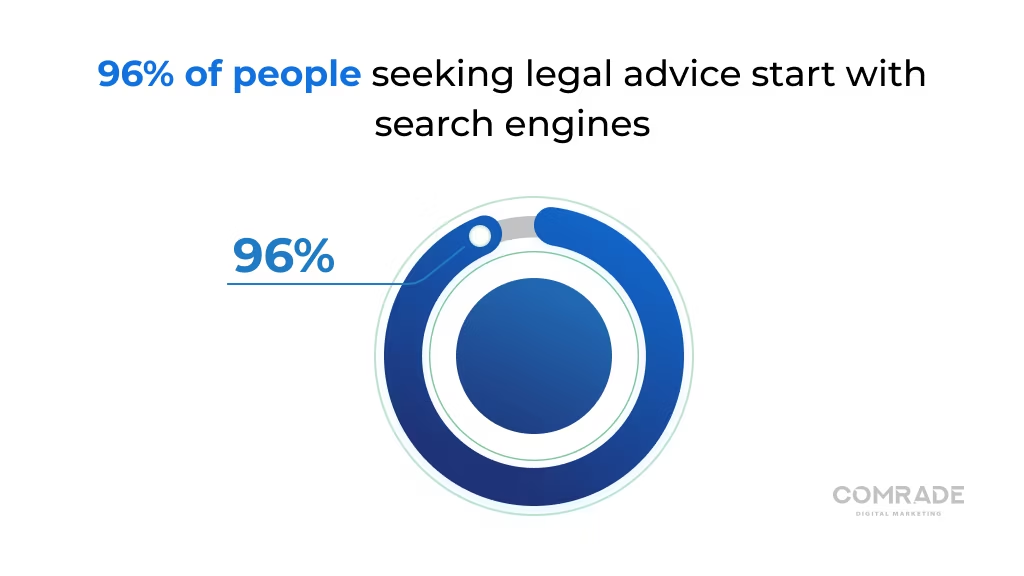
96% of people seeking legal advice start with search engines. And if your site doesn’t offer clear, helpful, trustworthy content, they’ll hire a lawyer that does.
The good news? Fixing your content pays you back double.
Just ask Stracci Law Group. Before working with Comrade, their website lacked an SEO structure and had content that just didn’t convert. Following an overhaul, they experienced a massive 1,591% surge in qualified leads and a 91% decline in the cost per lead.
In just 8 moves, your law firm website can attract highly qualified leads while you sleep, just like Stracci’s does. Let’s dive in!
Why Law Firm Content Marketing Is Pivotal In 2025
You could have the best legal team in the city — but if no one finds you (or trusts you), it doesn’t matter.
That’s where legal content marketing comes in. It ensures your legal practice appears when potential clients need help.
And here’s a fantastic monetary incentive: According to the Content Marketing Institute, content marketing costs 62% less than traditional marketing, and brings in 3x more leads.
Here’s a quick glimpse into what good content does for your firm:
- Builds online visibility: Blog posts and service pages optimized with relevant keywords help you rank higher on Google, right where people are searching for help.
- Builds trust: Helpful, relevant content shows clients you know your stuff — and that you care enough to explain it clearly.
- Attracts better leads: Instead of wasting time on bad-fit leads, you start hearing from people who are already informed and ready to move forward.
The bottom line? If you’re not publishing content that answers real questions and solves real problems, someone else is — and they’re signing the clients you’re missing.
Don’t overthink it. Discover how the best law firms are turning simple blog posts into powerful lead machines.
5 Essential Parts of a Robust Legal Content Strategy
If you want your content to work — i.e., attract the right people looking for legal assistance — you need a plan.
Remember, a strong content strategy doesn’t have to be complicated. You just need to follow a few smart steps.
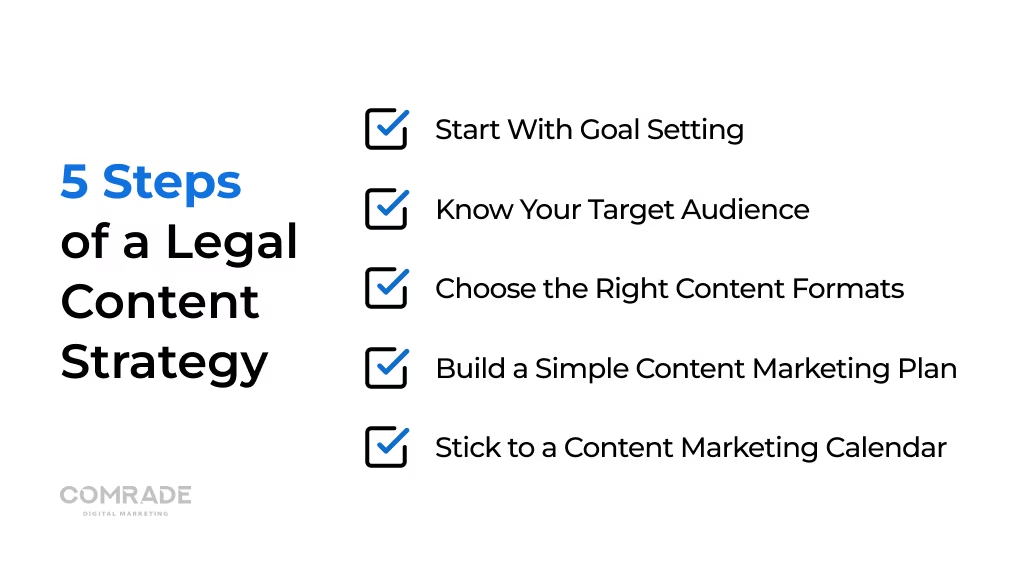
Step 1: Start With Goal Setting
What do you want your content to do?
- Bring more traffic to your site?
- Educate potential clients about your services?
- Generate consultation requests?
Without clear goals and a deep understanding of your audience, it’s impossible to know what to create.
Step 2: Know Your Target Audience
Who are you writing for? Your target audience might include:
- First-time offenders
- Small business owners
- Injured workers
- Family members looking on behalf of someone else
Each group has different fears, questions, and ways of searching online.
Tip: Talk to your intake staff. What questions do prospective clients ask over and over? That’s your content roadmap!
Step 3: Choose the Right Content Formats
Not every topic needs to be turned into the same type of content. Consider:
- Blog posts for FAQs and step-by-step guides
- Videos for breaking down complex legal topics
- Infographics for timelines or visual processes (great for injury or criminal defense cases)
- Review-focused web pages with satisfied client testimonials or case studies
Use different website content formats to meet your audience where they’re at. Also, consider a healthy mix of commercial and educational content.
Step 4: Build a Simple Content Marketing Plan
Now that you know your goals, audience, and formats, it’s time to bring it all together. Your content marketing plan outlines:
- What types of content do you create
- Who’s responsible for writing, reviewing, and publishing
- Where you’ll distribute it (website, email, YouTube, etc.)
- How you’ll measure success (leads, traffic, rankings)
Think of this as your high-level strategy. It keeps your team aligned and focused on results, not just content for content’s sake.
Step 5: Stick to a Content Marketing Calendar
A great plan is useless without great execution. This is why a content marketing calendar is important to help you stay consistent. It tells you:
- What to publish and when
- Which topics are scheduled or in progress
- Deadlines for drafts, reviews, and uploads
- Key dates to align with (seasonal trends, legal changes, events)
Whether you use a simple spreadsheet or a tool like Trello or Asana, an editorial calendar keeps your legal content organized and predictable, so your visibility compounds over time.
Real-World Proof: When we followed this exact playbook for Lehmbecker Law — revamping their site, building targeted content, and integrating SEO — they saw a 1,425% increase in qualified leads and a 645% marketing ROI.
And remember, you don’t need a 30-page website — just a clear structure, consistent publishing, and the right content in front of the right people.
Ready to grab attention and drive more consultations? Read our guide on how to execute law firm copywriting in 4 steps.
4 Types of Legal Content to Engage and Educate Your Clients
The most effective legal content is simple, clear, and tailored to the way real people search for answers.
And the best part? You’re not limited! There are multiple content types that the legal industry uses to boost client engagement. Here’s what your content calendar could include:
Blog Posts
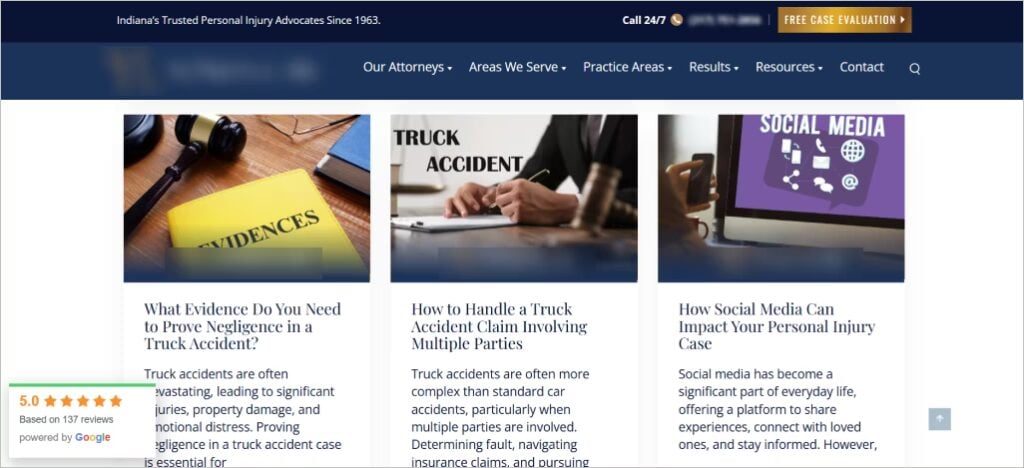
Blog posts are the backbone of most law firm content strategies, and for good reason. They help you:
- Answer common client questions
- Improve SEO by targeting specific keywords
- Build authority around practice areas
- Bring consistent organic traffic to your website
Examples:
- “What to Do After a Car Accident in [City]”
- “DUI vs. DWI: What’s the Difference in [State]?”
Tip: Keep posts easily scannable. Use headers, bullet points, and plain English.
Videos
Some people prefer to watch instead of read, especially when dealing with stressful legal issues. Short, informative videos are great for:
- Explaining complex legal processes
- Building your law firm’s credibility by showing social proof (client success stories)
- Boosting time-on-page (great for SEO)
You don’t need fancy equipment. A 1–2 minute video shot on your phone with clear audio and good lighting is more than enough.
Ready to turn your videos into a steady flow of new leads? Master the art of video marketing in our new guide.
Podcasts

If your firm has a lot to say — or wants to position itself as a thought leader — consider launching a legal podcast. They’re ideal for:
- Breaking down trending legal news
- Interviewing other professionals
- Reaching busy listeners (commuters, business owners, etc.)
Not ready for a full series? Try guest-starring on other legal or business podcasts first!
Infographics
Visual learners love infographics, and they’re perfect for simplifying complex information.
Use them to map out timelines (e.g., personal injury claim process), compare legal options, or walk clients through next steps.
Bonus: Infographics are highly shareable and can be repurposed on social media platforms, blogs, and printed materials.
No matter which format you choose, the goal of your content marketing strategy should be to make people feel informed and confident.
1. Build Authority (and Trust) with Every Piece of Content
People don’t hire the first lawyer they see — they hire the one they trust.
When your law firm consistently focuses on high-quality content creation, you’re doing more than sharing information — you’re showcasing your legal expertise, answering real client questions, and building credibility one post at a time.
Think about it:
- A detailed blog explaining “what to do after a car accident” tells a personal injury client you know your stuff.
- A short video breaking down immigration timelines shows empathy and authority.
- A well-researched FAQ helps someone facing criminal charges before they’ve even spoken to you.
In fact, 70% of buyers say they consume 3–5 pieces of content before reaching out to a business. For law firms, that means your next client might already be reading!
Here’s a quick trust-building checklist for every piece of content:
- Is it clear? (No legalese. Use plain language that your audience understands.)
- Is it relevant? (Address a real problem or question your ideal client is facing.)
- Is it accurate? (Back it up with facts, current laws, or credible sources.)
- Is it useful? (Does it offer actionable advice or next steps?)
- Is it personal? (Show empathy or add a human touch — it goes a long way.)
- Is it branded? (Make sure your tone, visuals, and CTAs reflect your firm.)
What’s the takeaway here? Don’t just tell people you’re an authority — prove it through content. Let your expertise work for you 24/7.
2. Keep It Fresh: Update and Repurpose Your Content
You don’t always need to start from scratch. Some of your best-performing content might already exist — it just needs a little love.
Updating your content is the easiest way to stay relevant in a fast-changing legal landscape. HubSpot found that updating old blog posts increased traffic by 106% on average.
If your blog post on “DUI laws” is from 2020, it’s time for a refresh. Update the laws, add recent case examples, or improve the structure so it’s easier to read. Google loves fresh content — and so do your clients.
So, for instance, you could turn your blog post into:
- A LinkedIn carousel
- A YouTube short or Instagram Reel
- A slide for a webinar
- A Q&A email
- A downloadable checklist or FAQ guide
This gives your message more mileage without more hours of work, and it meets your audience wherever they like to consume information.
So, before you spin your wheels with your content marketing efforts, check your archives. A few strategic tweaks could unlock a flood of fresh engagement.
3. Use AI to Speed Up the Content Creation Process
If you’re skeptical about AI, you’re not alone. Just remember, AI isn’t here to replace your expertise — it’s here to help you scale it.
With the right prompts, AI tools can generate content ideas, write first drafts, suggest SEO keywords, and even reformat long content into social media posts or emails. For busy law firms, it’s a game-changer.
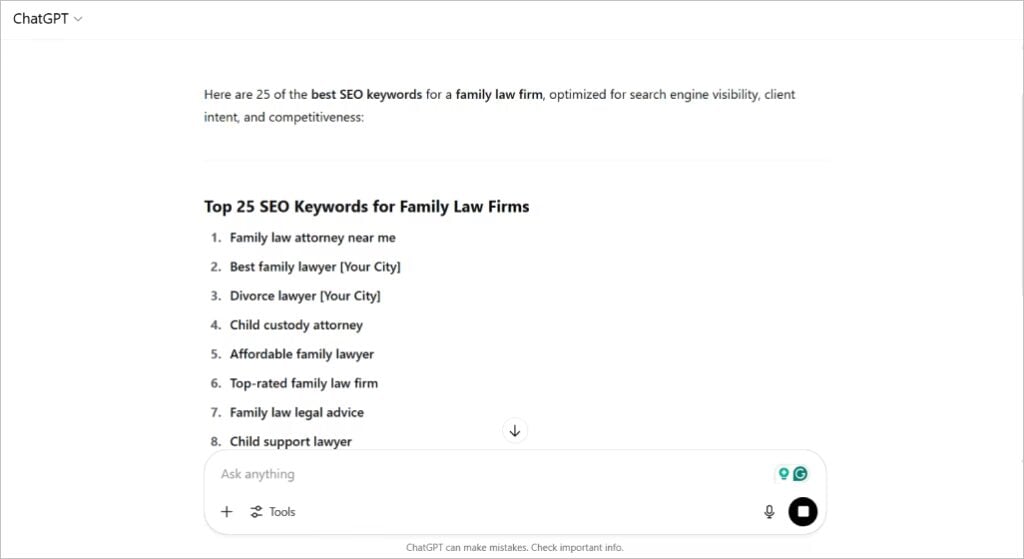
But don’t hit publish without reviewing.
AI doesn’t know your jurisdiction, tone, or strategy. You do. Think of it as a junior copywriter — fast and efficient, but needs a human editor.
Here’s what AI content generation can do for your law firm:
- Speed up first drafts for blogs, FAQ pages, and practice area content
- Repurpose old content into new formats (e.g., blog → video script → LinkedIn post)
- Help with SEO by suggesting long-tail keywords or optimizing meta descriptions
- Generate ideas for articles, emails, social posts, and intake handouts
Top AI Tools to Try:
- ChatGPT– Great for ideation, outlines, and rewrites
- Jasper – Built for marketers with templates for blogs, ads, and more
- Copy.ai – Quick social captions, headlines, and summaries
It’s worth repeating: AI content can get you 80% there, but your voice, legal knowledge, and compliance insight are what make you trustworthy.
To help you get started, check out the top 25 AI tools for lawyers in 2025.
4. Optimize Your Legal Content for Google (And Humans)
Writing great content is only half the battle. If no one sees it, it won’t drive leads. After all, 75% of users never scroll past the first page of Google.
That’s where SEO (search engine optimization) comes in. It pushes your content to the top of Google when people search for answers related to your legal services. Here’s how to do it correctly:
Start with Keyword Research
Before you write, figure out what your audience is searching for. Use tools like Google Keyword Planner or Ubersuggest to find high-intent terms that are locally relevant (e.g., “car accident lawyer [city]”).
Pro Tip: Focus on long-tail keywords like “what to do after a bike accident in Chicago” — they convert better and are easier to rank for. Plus, theyaccount for over 70% of all web searches!
Use On-Page SEO
Naturally, include your relevant keywords in key areas on your website:
- Page title and meta description
- Headings and the first paragraph
- URL and image alt text
Write for humans first, and search engines second — clarity always wins.
Link Internally
Don’t let your content live in isolation. Internal links help Google crawl your site, keep users engaged longer, and boost your SEO.
For example: Got a blog post on “What to Do After a Car Accident”? Link it to your “Personal Injury Services” page. The more connected your pages are, the more authority your site builds.
Optimize Over Time
Google rewards content that’s useful, well-structured, and regularly updated:
- Keep content fresh — update posts with new laws, stats, or FAQs
- Add schema markup to improve how your listings appear in Google
- Use analytics to optimize your content’s performance
Not just law firms, but all businesses that prioritize SEO and blogging are 13x more likely to see a positive ROI.
P.S. What if you could almost guarantee SEO success? Check out the key Google ranking factors to rise to the #1 spot on search results!
5. Spread Your Content Far and Wide
Writing content is just the first step when marketing for law firms.
If you don’t promote it, you’re limiting its impact — no matter how valuable it is.
Content distribution is how you make sure your blog posts, videos, and other resources actually reach the people who need them! A well-distributed article can bring in leads for months (or years).
Here are the most effective distribution channels for law firms:
Social Media
Yes, social media works for lawyers if used strategically.
- LinkedIn is ideal for thought leadership, firm updates, or educational legal content.
- Facebook is effective for client-focused areas like personal injury, family law, or criminal defense.
- Instagram or TikTok can be powerful if you’re targeting younger audiences or sharing quick video explainers.
Social posts with images or videos see 2x more engagement, and short, value-packed captions increase reach. But don’t just drop a link — include a takeaway, quote, or short summary. It gives people a reason to click.
Email Newsletters
Email newsletters are one of the highest ROI marketing channels, especially for nurturing past and potential clients. Use newsletters to:
- Share new blog posts, videos, or legal guides
- Answer common legal questions
- Highlight recent wins or testimonials
- Remind people whom you help and how
Firms that use email marketing see an average 3,600% ROI or $36 for every $1 spent!
Bonus tip: Segment your email list by practice area or client type for better relevance and engagement.
Legal Directories
Many legal directories offer space to publish content or link back to your site, improving both your audience reach and SEO. Focus on directories like:
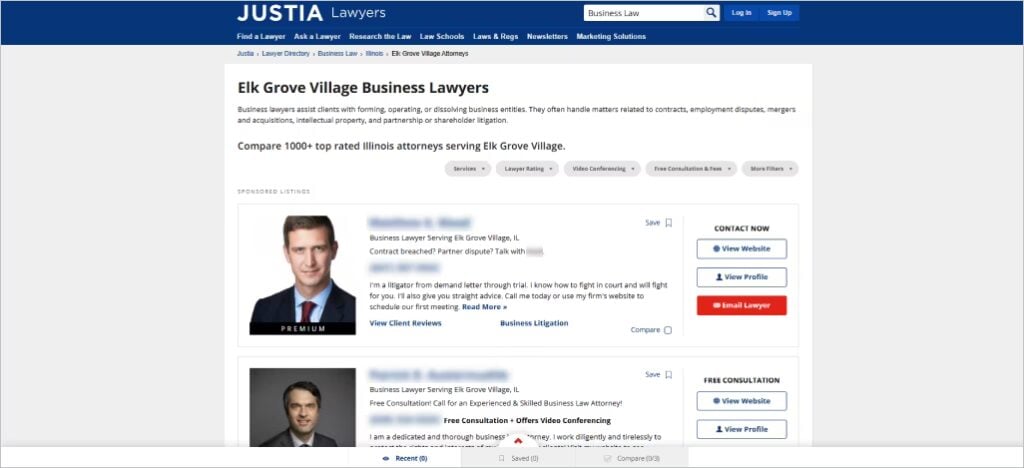
But don’t stop there. We compiled a full list of the top legal directories in 2025.
Your Own Website’s Internal Links
Never underestimate the power of smart internal linking. Add links to related blog posts, FAQs, or service pages to guide visitors and keep them engaged longer.
This improves user experience and helps search engines better understand your site structure, which can boost rankings.
Speaking of, make sure to check out our article on the best link-building tactics for lawyers!
Guest Features & Partner Content
Don’t keep your content locked on your site — partner up.
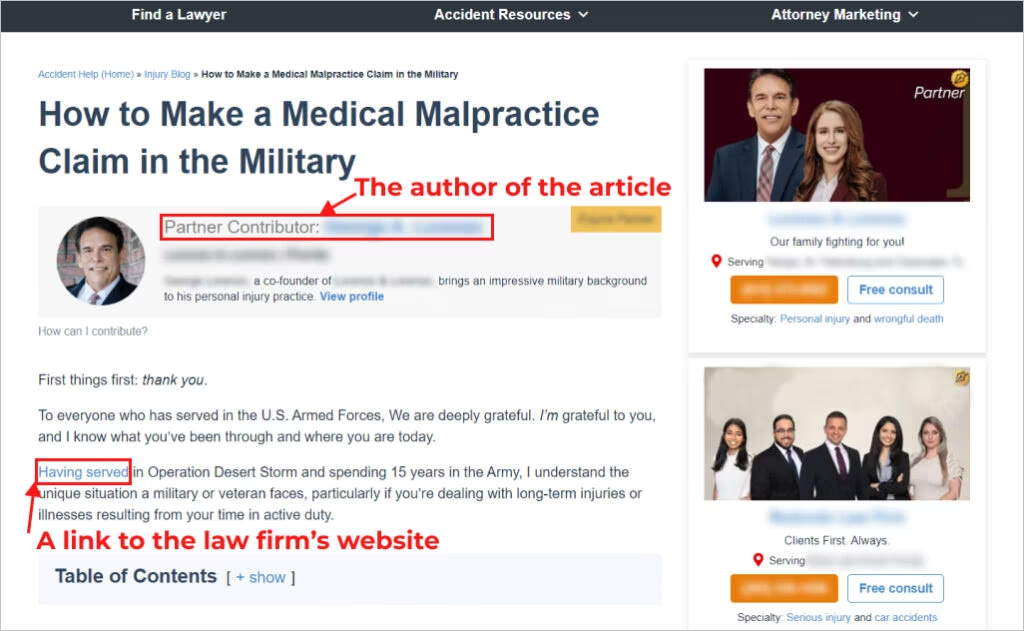
Write a guest post for a local bar association, answer questions in legal forums, share a tip with a referral partner’s audience, or get featured in a legal publication.
By sharing your work across social media, email, legal directories, and partner channels, your content keeps working for you long after you hit “Publish”.
6. Polish Your Website to Support Your Content Efforts
You can publish the best content in the world, but if your law firm’s site is slow, clunky, or confusing, most visitors will bounce. That could mean missed cases worth $5,000+ just like that!
Great content needs a great foundation. That starts with a website design that prioritizes user experience. Here’s what that looks like in practice:
- Mobile Responsiveness: Over 63% of legal searches happen on mobile devices. If your site isn’t mobile-friendly, you’re losing leads. Your content should look just as clean and readable on a phone as it does on a desktop.
- Fast Load Speed: Even a one-second delay can drop conversions by 7%. Speed isn’t optional — it’s part of the experience.
- Clear Calls to Action (CTAs): Don’t make people guess what to do next. Whether it’s “Call Now,” “Schedule a Free Consultation,” or “Download Our Legal Guide,” every page should guide website visitors to the next step.
- Easy Navigation: Make it simple to browse your practice areas, blog posts, or FAQs. If people can’t find the content they came for, they’ll leave — fast.
Your content can’t perform if your site holds it back. With that said, we all need a little inspiration! Check out the top 60 legal websites in 2025.
7. Measure and Optimize Your Legal Content
Does your content perform? Effective content marketing strategies involve keeping an eye on key metrics. They’ll show you what’s working, what’s not, and where to improve.
Here are the top metrics law firms should focus on:
Website Traffic
This tells you how many people are visiting your site. If you’re publishing regularly but traffic isn’t increasing, it may be time to revisit your topics or SEO strategy. Fun fact: Websites that blog regularly get 55% more traffic than those that don’t!
Engagement Rates
Metrics such as time on page, scroll depth, and bounce rate help you understand if people are actually reading your content or just clicking and leaving. Here’s what to look for in your Google Analytics:
- Bounce Rate: A bounce rate under 40% is excellent for law firm websites. Anything higher might mean your content isn’t relevant or easy to navigate.
- Time on Page: Aim for 1:30 to 2:30 minutes per visit. If users are leaving after 30 seconds, they’re not finding what they need.
- Scroll Depth: Use tools like Hotjar or Crazy Egg to see how far down the page users are reading. If most stop after the first section, your content may need a stronger hook or more visual breaks.
Conversion Rates
Are visitors turning into leads? Whether it’s a form submission, phone call, or consultation booking, figure out if your content moves people to take action.
The average conversion rate for legal websites is typically around 2% to 5%, but top-performing sites can reach 7% or higher. Here’s what to watch for:
- Click-Through Rate (CTR): Are users clicking internal links or CTAs? If not, you may need to make your calls to action more relevant.
- Form Starts and Abandons: If visitors begin filling out a form but don’t complete it, it may be too long, unclear, or poorly timed.
Even a 1% increase in conversion rate can significantly boost your revenue without increasing traffic.
Bottom line: You don’t need to obsess over every number, but tracking the right ones will help you pinpoint what’s working and what’s not.
Ready to go a step further? Learnhow to boost your conversion rate with a few simple tricks!
8. Make Content Part of Your Bigger Marketing Picture
Valuable content doesn’t live in a vacuum.
If your blog says one thing, your ads say another, and your intake team isn’t on the same page — you’ve got a disconnect. That confusion will cost you clients.
To really move the needle, your content marketing needs to align with your overall marketing strategy. That means tying your blog posts, videos, emails, and FAQs into a broader, holistic strategy that supports your branding, advertising, and client relationship management.
Think of your content as the glue that holds your marketing together:
- Branding: Make sure your tone and visuals are consistent, whether someone finds you through a blog, Facebook ad, or referral email.
- Advertising: Use content to warm up leads from PPC campaigns or retarget people who visited your practice area pages.
- Client Relationships: Follow up consultations with helpful resources (like blog links or guides) to reinforce value and stay top-of-mind.
Firms that integrate their marketing efforts see up to 30% higher engagement across campaigns.
This means creating content isn’t just about your search engine rankings — it’s about giving people a cohesive, trustworthy experience wherever they find you.
Big picture thinking brings you business! Check out how to build a 360-degree law firm marketing plan to book clients faster.
Bonus Tip: Outsource Your Content to Book Clients Faster!
Attract bigger cases, build a full pipeline, and stop wasting time on leads that go nowhere.
As a trusted law firm marketing agency, Comrade Digital Marketing brings a combined 80+ years of experience creating ROI-focused content, SEO, PPC, and web design strategies, to deliver:
- Up to 937% more qualified leads
- An average of 600% returns on your marketing investment
- A steady pipeline of clients week after week
Why let your competitors take the leads that should be yours?
Schedule Your Free Consultation Now

Your no-obligation free Growth Plan reveals:
✔ Strengths and weaknesses in your website and SEO
✔ Missed opportunities for leads, clients, and revenue
✔ How to increase your visibility and conversions
